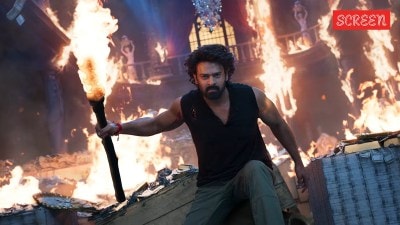Pascal8217;s Wager
Blaise Pascal, the 17th century French mathematician, may not seem like the paramount authority on film directing, but he made a bet that is...

Blaise Pascal, the 17th century French mathematician, may not seem like the paramount authority on film directing, but he made a bet that is illuminating nonetheless.
Pascal8217;s Wager was with God. Rather it was with himself, about God. He rationally reasoned that either a I believe God exists, or, b I don8217;t believe He / She exists. And either a God exists or, b God doesn8217;t exist.
A film director wagers with his soul, his innermost voice, along similar lines. It is to do with the conviction 8212; this is a the film I have to make, versus b the film I should make. Then either a the film succeeds, or b it fails.
Pascal reasoned through all the permutations. When I believe God exists, and He / She does, then I8217;m set, ready for heaven. If I believe in God, and it turns out there is no God then I don8217;t look quite so smart. Now in the case where I don8217;t believe in God, and He / She doesn8217;t exist, I feel really special. But in the fourth case, if I don8217;t believe in God and He / She does exist 8211;then I am completely screwed. Thinking through this, Pascal figured, I therefore better believe in God, otherwise I will go to Hell, and anything is better than going to Hell. Similarly, film directors sift through the permutations, and realise that the worst possible scenario is to try and make the film you should make versus the film you have to make, and the film turns out to be a failure 8212; critically, commercially, and most importantly personally, since you never wanted to make it anyway.
Not that it8217;s easy to make the film you want. I would like to believe that another Frenchman, the sculptor Auguste Rodin, had some sort of prescience about the dilemma of film directors while creating one of his masterpieces, The Gates of Hell. At the top of the gates is The Thinker 8212; the artist, seated in contemplation, a sculpture that Rodin later gave independent life to. Closely scrutinised in The Gates of Hell, The Thinker has no eyeballs, no ears, and no genitalia. He is impervious to theoutside world, which in this case, includes ghastly human figures of all shapes and sizes, contorted and distorted, literally screaming out of the sculpture, trying to sway him from his path. Anyone who has seen a shoot taking place will note the obvious parallels to a film set.
I cannot even imagine the kind of logistical nightmares J P Dutta faced shooting his action sequences for Border in the Rajasthan desert at the mercy of the elements 8212; 48 nights of madness with multiple cameras, tanks, jet fighters, explosives, hundreds of junior artistes in Indian and Pakistani Army uniforms of various ranks; fighters, action co-ordinators and a generous handful of the top stars of the industry to boot. There are countless other stories 8212; shootings postponed and sets standing for months on end because the leading lady has had a nervous breakdown, so the producer asks the director, quot;Do we reshoot everything from scratch, or wait for the wind to change?quot;
Everything, from the weather to a single synapsesnapping, can send your schedule, your world, and your precarious film totally haywire. All the production cock-ups possible, all the endless delays, mistakes, accidents, and natural disasters will be laid in front of the director8217;s path, trying to deflect him from his conviction.
Hand in hand with that are the pundits, who will ask what you are doing and then explain to you why it is wrong, or if it is right, how it has already being done better by somebody else, faster than you.
But somehow or the other the director has to find a way to keep going. The renowned Italian-American director Martin Scorsese observed, quot;Whenever I meet a young director who is looking for guidance and advice, I tell him or her to look to the example of John Cassavetes, a source of the greatest strength. John made it possible for me to think you could actually make a movie 8212; which is crazy, because it is an enormous endeavour, and you only realise how enormous when you8217;re doing it. But by then it is too late.quot;
Which is whydirectors have to accept the rationale of Pascal8217;s Wager and begin to believe in God.
Rohan Sippy is a scriptwriter and TV producer
- 01
- 02
- 03
- 04
- 05































